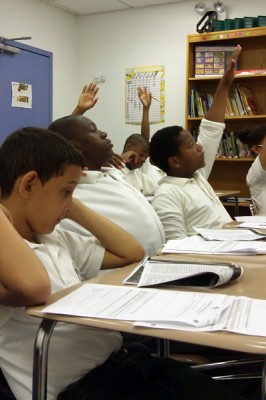In a vote of confidence for charter schools it deems “high quality,” the U.S. Department of Education announced grants totaling $25 million to charter school networks they believe have proved successful at raising student achievement.
“Several high-quality charter schools across the country are making an amazing difference in our children’s lives, especially when charters in inner-city communities are performing as well, if not better, than their counterparts in much wealthier suburbs,” U.S. Secretary of Education Arne Duncan said in a press release on Wednesday. “Every one of our grantees serves a student population that is majority low-income and virtually all exceed the average academic performance for all students in their state.”
Charter schools are publicly funded but typically freed from rules and regulations that traditional public schools must adhere to. The new grant will give the largest share — nearly $10 million — to help build the KIPP network another 16 schools throughout the U.S.
In New York City, the Success Charter Network, run by Eva Moskowitz, will receive almost $2 million to construct six new schools in New York. The network runs nine schools in the city.
Moskowitz and KIPP co-founder David Levin sat down earlier this month with PBS Education Correspondent John Merrow, who writes the blog Taking Note, to discuss the charter movement’s influence on American education. Levin had just been featured in a New York Times article by Paul Tough.
Charter schools first opened in Minnesota in 1992, and now represent about five percent of all schools in the U.S.
They are only responsible for educating about two percent of students, yet they’ve been embraced in major American cities like New Orleans and Detroit.
Some have questioned the need for charters at a time when public schools face diminishing resources and renewed pressure to perform. In addition, charters must often compete with public schools for space and students.
Moskowitz argued for schools to become “more compelling places” where kids actually want to go.
Moskowitz and Levin agreed on most points during their talk with Merrow, but differed on the benefits of rote learning. Both felt teaching should be considered a far more important job than it is.
“[Teachers] are trapped in a system that doesn’t nurture success,” Levin said. “The biggest tragedy in public school right now is that you can be a great teacher and it is completely uncertain what happens to your kids the next year.”
Below is a chart showing all the grantees that will receive federal dollars to expand their charter school networks.
| Name | Funding Amount | Project Description | |
|---|---|---|---|
| KIPP Foundation in consortium with KIPP regions | $9,463,103.00 | 18 new schools in Atlanta, GA, Austin, TX, Chicago, IL, Washington, DC, Gaston, NC, Houston, TX, Jacksonville, FL, Los Angeles, CA, Memphis, TN, Newark, NJ, New York, NY, and San Antonio, TX | |
| Rocketship Education | $1,881,569.00 | 56 new schools in Oakland, Milwaukee, New Orleans, and Chicago | |
| DC Preparatory Academy | $878,824.00 | 4 new schools in Washington, DC | |
| Success Charter Network, Inc. | $1,740,970.00 | Project description: 6 new schools in New York | |
| Richard Milburn Academy, Inc. | $1,575,562.00 | 6 new schools in Texas | |
| Uncommon Schools | $1,400,000.00 | 9 new schools in Newark and Boston | |
| Breakthrough Charter Schools | $3,488,060.00 | 8 new schools and 3 expanded schools in Cleveland, OH | |
| Alliance College Ready Public Schools | $3,139,983.00 | 10 new schools in Los Angeles | |
| Cosmos Foundation, Inc. | $1,431,929.00 | 7 new schools in Texas |
Source: ed.gov




